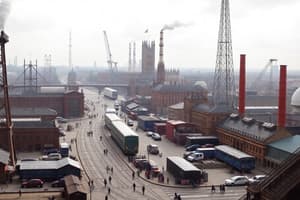Podcast
Questions and Answers
By the end of the century, what did Britain's empire become?
By the end of the century, what did Britain's empire become?
- Culturally isolated
- Economically weak
- Commercially dominant
- Politically dominant (correct)
What was the approximate population of Britain in 1815?
What was the approximate population of Britain in 1815?
- 10 million
- 30 million
- 13 million (correct)
- 20 million
What was the main change in the political balance by the end of the century?
What was the main change in the political balance by the end of the century?
- Most men gained the right to vote (correct)
- The monarchy became more powerful
- Women gained the right to vote
- The aristocracy gained more power
What was the theme of William BdlScan's painting 'Iron and Coal'?
What was the theme of William BdlScan's painting 'Iron and Coal'?
What was the main reason for the growth of the middle class?
What was the main reason for the growth of the middle class?
What was the main implication of Britain being the 'workshop of the world'?
What was the main implication of Britain being the 'workshop of the world'?
What was the characteristic of the British people during the mid-nineteenth century?
What was the characteristic of the British people during the mid-nineteenth century?
What was the situation of the working class by the end of the century?
What was the situation of the working class by the end of the century?
What was the main source of Britain's strength in Europe after the defeat of Napoleon?
What was the main source of Britain's strength in Europe after the defeat of Napoleon?
What was Britain's primary aim in Europe after the defeat of Napoleon?
What was Britain's primary aim in Europe after the defeat of Napoleon?
Which of the following nations limited Russia's influence in Europe?
Which of the following nations limited Russia's influence in Europe?
What was Britain's primary objective outside of Europe?
What was Britain's primary objective outside of Europe?
Why did Britain take over and occupy various places around the world?
Why did Britain take over and occupy various places around the world?
What was Britain's main anxiety in its foreign policy during the 19th century?
What was Britain's main anxiety in its foreign policy during the 19th century?
What was the result of Britain's defense of its interests in the 19th century?
What was the result of Britain's defense of its interests in the 19th century?
Why did Britain not wish to colonize everywhere?
Why did Britain not wish to colonize everywhere?
Flashcards are hidden until you start studying
Study Notes
Britain in the 19th Century
- Britain was at its most powerful and self-confident in the 19th century.
- After the Industrial Revolution, Britain was the "workshop of the world," producing more than any other country.
- By the end of the century, Britain's empire was more political than commercial, controlling large areas of the world.
British Empire and Imperialism
- Britain used its empire to control large areas of the world, giving the British a sense of their own importance.
- The empire was a major feature of British life, and the British took pride in their imperial possessions.
Middle Class and Industrialization
- The rapid growth of the middle class was part of the enormous rise in population, from 13 million in 1815 to over 40 million by 1914.
- The growth of the middle class was driven by industrialization, and most men had the right to vote by the end of the century.
Working Class and Politics
- The working class, who had left their villages to become factory workers, had not yet found a proper voice in politics.
- The aristocracy and the Crown had little power left by 1914, and politics and government were increasingly controlled by the middle class.
Britain's Strength in Europe
- Britain's strength in Europe lay not in its population, but in its industry and trade, and its navy, which protected its trade.
- Britain wanted a "balance of power" in Europe, which would prevent any single nation from becoming too strong.
- Britain also wanted a free market in which its industrial and trade superiority would give it a clear advantage.
Britain's Foreign Policy
- Britain wanted to defend its trading position and keep its interests strong, and it defended its interests by keeping ships of its navy in almost every ocean.
- Britain took over and occupied several places during the war against Napoleon, including Mauritius, the Ionian Islands, Sierra Leone, Cape Colony, Ceylon, and Singapore.
- Britain's main anxiety in its foreign policy was that Russia would try to expand southwards into the Mediterranean.
Studying That Suits You
Use AI to generate personalized quizzes and flashcards to suit your learning preferences.




